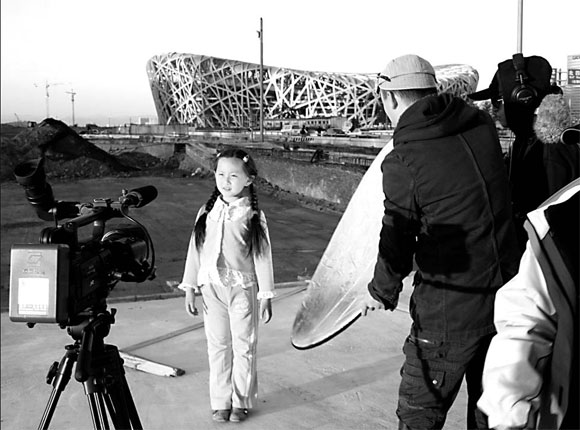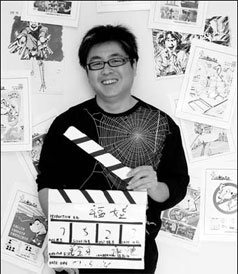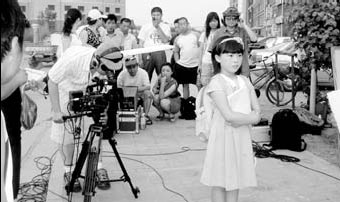
Fuwa production team at the construction site of the Beijing Olympics.
Six-year-old Ma Junbo drew Fuwa, the mascots of Beijing Olympic Games, all over a wall of her home and asked kids living in Tiantongyuan community to join in. The girl's parents later painted the wall purple to cover up the drawings. Neighbors didn't think it was anything out of the ordinary, but when Jiang Yuan heard about it he was inspired to make a film.
"There are around 400,000 residents in Tiantongyuan, which is said to be one of the largest communities in Asia," says Jiang, a Beijing-based ad and MTV director.
"It provides an immense source of inspiration for me. I had always wanted to shoot short films about people's lives after I moved here. And I felt that Ma's story might be a great start."
Jiang revealed on the community network that he would develop Ma Junbo's story into a DV (digital video) production. It would include five independent stories showing the children's attitudes toward the Olympics. Many neighbors then contributed their ideas online, which helped Jiang develop the final scenario.
The project also caught the attention of local media.
 "I felt a lot of pressure as people kept asking me how the film was going. I had intended to make a low-budget DV thing. But that couldn't fulfill people's bubbling expectations. It had become such a big affair that I ended up preparing a real film," Jiang says.
"I felt a lot of pressure as people kept asking me how the film was going. I had intended to make a low-budget DV thing. But that couldn't fulfill people's bubbling expectations. It had become such a big affair that I ended up preparing a real film," Jiang says.
The one-hour-long film, Fuwa, was mostly set in Tiantongyuan. The directing team selected 10 lead actors and actresses (five as backups) out of the nearly 700 that auditioned last March. The five children characters in the film are named after the five Fuwa mascots. They will each demonstrate a traditional Chinese folk art. For instance, one of the characters is adept at paper cutting. The others will be skilled in either guzheng (a plucked musical instrument), Peking Opera, wushu (a kind of kungfu) or kite making.
Despite being a relatively inexperienced film director, Jiang was one of only three professionals on the set, the others being the photographer and the coordinator. The remaining staffers were all volunteers from the neighborhood. The crew was constantly rotating, as many needed to work, which meant that Jiang had to repeatedly show people how to handle the microphone pole or set props.
Jiang says that there were at least 1,000 Tiantongyuan residents who participated in the production. Every day meant juggling different tasks and facing new challenges.
Jiang and his team spent more time looking for "Ni Ni" than any other character. "Ni Ni" comes from a rural migrant family whose parents own a newspaper stand. He sees a kite in the sky one day and makes one of his own. Jiang says that while many city children tried out for the role, it was a boy from a migrant family in Tiantongyuan who was chosen.
Few of the cast members had been in a film before and they were curious about everything. In one scene, a senior supporting actor gazed at the camera and forgot his lines. Instead, he muttered, "really, I am in a film."
"The film was synchronized and his words were all recorded. We had to start all over again. The same thing happened to other actors too," Jiang says.
The director says that he has invested nearly his entire life savings into the film, over 100,000 yuan ($14,045). A non-profit project, Jiang turned down several offers of sponsorship and refused to collect donations from residents.

The casting of Fuwa attracts spectators in Tiantongyuan community. Photos courtesy of Jiang Yuan
"Firstly, I couldn't find an independent unit that would supervise the money. Plus, people were unpaid during the making and casting of the film. They have devoted themselves to the film, and that is enough," he says.
Fuwa will premiere in cinemas free of charge in mid April. Jiang says that 100 film DVDs will be delivered to Tiantongyuan residents.
Last month, Jiang was nominated for a prize for his devotion to Fuwa at the Ten Community Figures of Beijing awards.
"Making a film is much more painful and exhausting than I thought. Sometimes when I went back home after a day's shoot, I just wanted to pack up and run away from Tiantongyuan and the film," Jiang says.
"Then I received phone calls from neighbors who said 'Well, you don't know me, I live in Zone One. We appreciate your work. We are with you, dude ...'."
(China Daily March 13, 2008)